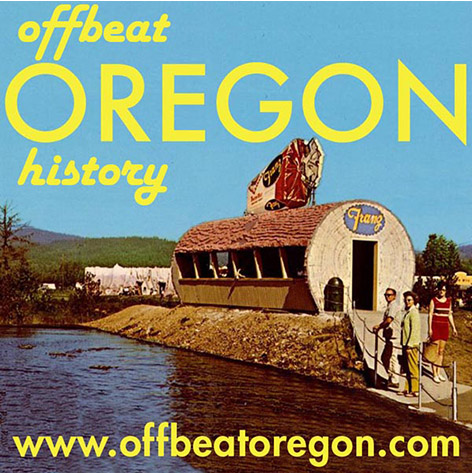GRANITE, BAKER COUNTY; 1880s, 1890s, 1900s:
The rowdy gold-mining ghost town of Granite
By Finn J.D. John
|

“We three girls ... had a glorious time,” Mrs. Niven wrote. “Every bachelor there at one time or another asked us for a date.” Granite was a hard-rock mining town, so mining operations were mostly hydraulic operations and sometimes involved stamp mills; the owner of a claim usually couldn’t work it alone. So the claim owners would hire crews of young men to dig ore, run sluices, and so forth. 
Downtown Granite as it appeared circa 1970, when Ote Ford was its sole occupant. (Image: Baker County Public Library)The hired hands would participate in most parts of the operation, but the cleaning of the sluice boxes — retrieving the gold from them — was typically done by the mine owner himself. Even so, lots of gold got stolen by hired hands, who would slip it into their socks or into special hollowed-out handles on their picks. All of them, owners and workers alike, were there for a good time rather than a long time. Then as now, Granite is tolerable in the late spring and early summer, glorious in late summer and early fall, and horrible for the whole rest of the year. Nobody wanted to put down roots and raise a family there. So, except for the ones who were seriously trying to impress one of the three or four available maidens, most of the lads partied hard and often, especially in the winter when the whole community was cut off from the outside world and there was almost literally nothing to do but drink whiskey and shovel snow. 
The Grand Hotel in downtown Granite, as it appeared in its heyday — within a few years of 1900. (Image: Baker County Public Library)“They would get hell-roaring drunk and gamble their hard-earned money away as if it were water,” Mrs. Niven said. “Usually when someone got liquored up he would march up and down the streets shooting off his guns. ... One fellow who was normally rather a quiet chap would occasionally go off on a big spree. When he did this we could always plan on some fancy buckarooing and hollering. He would mount his horse and ride up and down the streets hollering, making his horse buck, and shooting his gun in the air. He never hurt anyone, and it certainly was amusing to watch. I suppose you could class it as just good clean fun.” What she didn’t class as “good clean fun” was when liquored-up miners would waylay a Chinese miner and make him “dance” in the stereotypical Western manner by cracking pistols close by his feet. 
The students of Granite’s one-room schoolhouse pose for a photo in 1895. The cute young blonde woman on the far left is almost certainly Mrs. Neil Niven, the schoolteacher. (Image: Baker County Public Library)“We girls used to wish sometimes that the Chinese would get hold of a white man and make him dance to the tune of their knives,” she said. “All of the Orientals packed knives for protection, but they only used them among themselves, and not that very often.” When one of the miners would hit a big strike, he sometimes would treat the whole town to a big drunken party. “I remember one time a miner had just made a big strike,” Mrs. Niven said. “When he brought his bag of (gold) dust in he walked up to the saloon and, while standing at the door, he threw his bag of gold dust across the room and it lit on the bar, breaking the bag and making a big dent in the bar. He yelled ... ‘Come on, you mud sluckers, the drink is on me.’ It was one of the wildest, wooliest nights Granite ever had.” Mrs. Niven was 67 years old when she sat down with WPA writer William C. Haight in 1939 for the oral-history interview I’ve been quoting so liberally from. By then she was living in Canyon City with her husband, Neil. Writer Haight doesn’t give us a lot to go on; he seems not to have liked her very much. He describes her as a “short, round, dark-haired, slow-moving little lady,” and doesn’t even tell us her real name — no first name, no maiden name, just “Mrs. Neil Niven.” But he did his oral-history job like the professional he was, and her wry, witty, occasionally ironic voice comes through clearly to us. If you’re at all interested in frontier mining life, it’s well worth looking up. (Here is a link to it.) Neither of them could have known it, but Granite as she knew it had less than three years left. In 1942, with the U.S. involved in World War II, the federal government’s War Production Board decided gold mining was non-essential to the war effort, and shut down all gold mining in the country to free up the labor of the miners to do other work. The order was lifted after the war ended, but by then the mines had all lain fallow for four years; timbers had shifted and become dangerously waterlogged, some mines had filled with water, and the mines had been playing out anyway. Nobody bothered trying to reopen them; everyone just moved on. And Granite became a ghost town, more or less. But never completely. And today, it’s still growing. It’s a gorgeous little mountain town, about 4,500 feet above sea level; vacationers and elk hunters from other parts of the state come and see it, and fall in love with it. Consequently Granite is no longer the smallest incorporated city in Oregon. That honor now goes to nearby Greenhorn — whose year-round population is actually zero.
|




